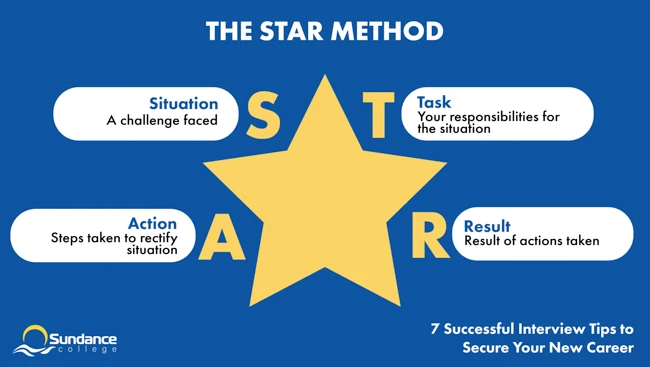Blog / Secure Your New Career with These 7 Interview Tips
Secure Your New Career with These 7 Interview Tips

Explore our Diploma Programs
- Business, Hospitality, and Legal
- Health and Human Services
- Technology
Table of Contents
With your diploma in hand, you’re ready to put your new skills and training to good use; it’s interview time!
Preparing for an interview can help you feel more confident in yourself and your responses. You never get a second chance to make a good first impression!
To optimize your chances of securing your ideal job, here are seven interview tips to remember when the big day arrives.
1. Know Your Audience
Prior to your interview, it is particularly important to research the role you are applying for, the company offering the position, and the wider industry.
Make sure you read and understand the job outline. Make a list of all your skills and experience that relate to the role in question to prepare yourself for the interview, which we will discuss in tip four.
Ensure you arrive with interesting things to say about the company by looking carefully at their website, following their social media accounts and company blog, and researching them to see if you can find any press coverage.
It is also a clever idea to research the wider sector so you can show awareness of any hot topics and who the company’s competitors are.
2. Make A Good First Impression
How you present yourself at the interview can significantly impact your chance of success. Remember, you only get one chance at making a good first impression, so dress well, be punctual, and come prepared.
Talk about your experience and skills with confidence and remain engaged and inquisitive throughout the interview.
Generally, a job interview calls for you to wear professional or business attire. For men, this might mean a suit jacket and slacks with a shirt and tie or a sweater and button-down. For women, a blouse and dress pants or a statement dress is appropriate.
Pro tip: The interview starts the moment you arrive. Remember to be friendly to the receptionist and smile at the people you meet while you are waiting for your turn to be interviewed.
3. Practice Nonverbal Communication
Beyond your experience and skillset, interviewers are looking to see if your temperament and personality will fit with the company’s culture. To do this, they will evaluate your nonverbal communication. This refers to the ways you communicate with others without words, including physical gestures and how you position your body.
Make sure your nonverbal communication reinforces what you are saying. You want your body to exude interest, respect, and confidence, all without saying a word.
- To do this, ensure you do the following:
- Greet everyone with a firm handshake
- Make eye contact while you or others are speaking
- Sit upright with good posture
- Smile when appropriate
4. Understand How To Answer The Questions
The interviewer will likely start with a few common interview questions, such as “could you please tell me a bit about yourself?”. This is not an invitation to talk about your personal life. What the interviewer really means is “tell me why you are a relevant candidate for this role”. Respond with a professional summary of your education, strengths, and previous work experience. Only listing skills applicable to the role in question. Remember to keep your answers concise.
The best way to navigate this successfully is to prepare answers for the most common interview questions, such as:
- Tell me about yourself
- What is your greatest strength/what is your greatest weakness?
- Tell me about a challenge you had to overcome at your last job
Pro tip: Look out for behavioral-based questions. Behavioral interview questions are questions based on how you acted in a specific situation. They are designed to measure how you react to stress and how you conduct yourself in a professional environment. A good example of a behavioural-based question is “tell me about how you worked effectively under pressure”.
A great way to handle these questions is by using the STAR method. This is a structured way of responding to a behavioral-based question by discussing the specific Situation, Task, Action, and Result of the situation you are describing.

5. Ask Thoughtful Questions
Arrive at the interview prepared with two or three questions that will help you gain a better understanding of your potential role within the company. Being able to ask interesting questions is as important as being able to answer them well, so take the time to prepare a few.
Some example questions you can ask are:
- What does a typical workday look like for somebody in this role?
- Are there opportunities for training and progression within the role/company?
- Can you tell me more about the team I would be working in?
- How would you describe the company culture?
And as a good rule of thumb, always keeps the questions professional.
6. Bring Copies Of Your Resume & References
Remember to bring copies of your resume and references in case there are multiple interviewers or the interviewer doesn’t have one handy. Having these at the ready leaves shows you to be an organized and forward-thinking candidate. Store them in a folder to ensure the paper isn’t wrinkled or creased.
7. Remember To Follow Up
Within 24 hours after the interview, it is a good idea to send a follow-up email to thank the person you interviewed with. Thank the interviewer for their time and consideration and reiterate your interest in the position. If you have any questions you were not able to ask during the interview, include them in your email. This demonstrates a commitment to the role and a high level of professionalism. As a bonus, it keeps you at the forefront of the interviewer’s mind!
If you haven’t heard back within two weeks of the interview, you can send a follow-up email to politely ask for an update.
Sundance Is Here To Help!
At Sundance, we are dedicated to supporting our students’ success, and that doesn’t end in the classroom. After all, we’re as excited as you are when you land your dream job!
To propel you forward toward that moment, our Career Services team provides a full range of supportive services to graduating students, such as resume preparation, interview skills, and job search techniques.
To learn more about how you can start your journey toward your new career, simply fill out this form: Request Info. Your personal Admissions Advisor will be in touch to answer all your questions.
Subscribe for more career advice
Blog Categories
Share on:
